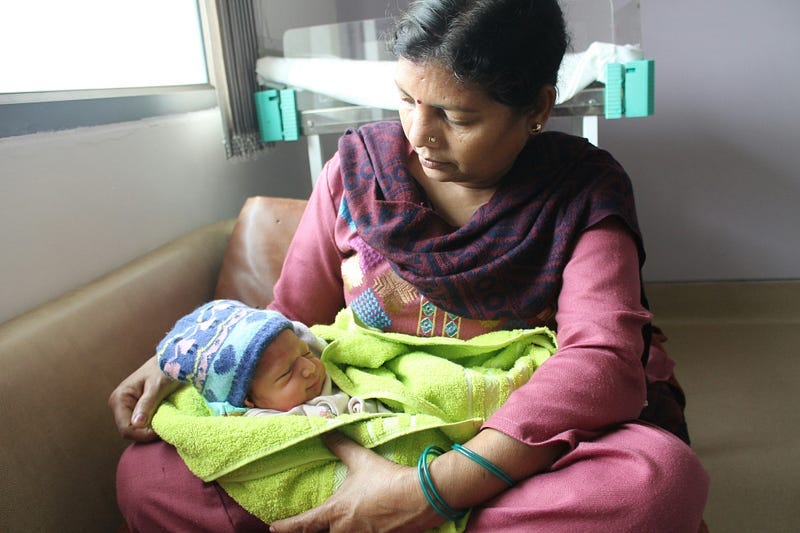One of the most important changes of the past few centuries is that industrialised societies have stopped having babies. Declining birth rates in the rich, advanced economies are largely to thank for globalisation and mass migration; the fact that rich countries don’t have babies anymore is a major cause of strain on pension and healthcare systems, a drain on economic dynamism, but also enables unprecedented personal freedom to those who choose not to have big families.
We typically take it for granted that rich societies have fewer babies, and yet the truth is much murkier.
In Europe, for example, richer countries like Ireland, Denmark and France often have higher birth rates than the weaker economies of the East and South like Italy, Ukraine and Albania. And although we often associate low birth rates with better-educated and more affluent societies, the opposite is often true within a country: in Sweden and most East Asian nations, the rich and well-educated are the most likely to have children. (In the US and UK, wealth correlates with higher fertility, but education does not.)
Amidst this chaotic picture, one point of clarity emerges: industrial societies have fewer babies. This has been true for 200 years — long before universal schooling, long before the rise of the office job, long before modern contraception, and long before the death of religion. For some unintuitive reason, farmers have babies and factory workers don’t.

The first clear drop in fertility appears in the early 1800s, when industrialisation was well underway in Britain and beginning its spread to neighbours like Belgium and northern France. Proto-industrial cottage work (e.g weaving and smithing) had been spreading for decades, but much of it could still be done in a barn or side room. By 1800, true industrial cities were taking shape. Manchester, for example, ballooned from 18,000 people in 1750 to 90,000 in 1800 and 400,000 by 1850.
To understand why this shift matters, let’s consider life before industrialisation. Most people were farmers, living in tiny rural communities. At the time of the French Revolution (1789), for instance, about a third of France’s population lived in rural hamlets of 35 people or fewer, many of whom had never had to use a surname before.
Most households owned tiny plots of land — nowhere near the scale of modern mechanised farms. A modern “small” farmer with one old tractor and a shed would have seemed like a feudal lord to these peasants. They had very little farm equipment, or much need for it: what they needed was someone to scare away birds, feed the chickens, collect firewood, and do other simple and menial work. As the old country saying goes,
“Children have two hands but only one mouth.”
The woman of the house could juggle child-rearing with domestic chores and outdoor labour. The children, meanwhile, could run around safely — no traffic, no sharp factory belts, no heavy machinery to cause a tragic accident.
The factories are not only scarier and tougher than the farm, but also more confusing. You can teach an 8-year-old how to fetch water or herd goats; you can’t teach them to troubleshoot a jammed power loom or calibrate steam-driven gears. Eventually, child labour laws would codify what parents already knew: kids are useful on farms but nearly useless in factories.
Supervision also becomes a huge issue. It’s hard enough keeping track of two children at the supermarket today — imagine trying to do that with eight children in 1850s London. Not as if the parents could afford that supervision anyway — the family now has to choose if it wants mother to look after the children or to work as a maid for a local businessman; she can’t work and child-mind at the same time anymore.

Even setting the mother aside, rural households tend to be multigenerational and community-based: if mommy can’t look after the children, then granny can; if granny can’t, then the neighbours can. But in a city that you moved to 5 years ago for a factory job, granny probably didn’t move with you, and you mightn't trust the new neighbours as much as the ones you grew up with.
What’s more, children in the city cost hard cash. In the countryside, space is abundant and food is partially self-produced. A child can live on eggs, scraps, and food that wouldn’t have sold at market anyway. In the city, food must be bought, and housing must be rented.
Urban life comes with new expectations. Bourgeois norms emerge: children should be washed, well-dressed and quiet. A mud-caked child is normal in a village, but a source of panic in a cholera-ridden slum. This new fear of germs creates a culture of prissiness and phobia: wearing hand-me-downs is no longer respected as a sign of honest frugality, but judged as stupidity and neglect. Luxuries start to become necessities: for no particularly good reason, everyone now needs a set of special clothes to wear on Sunday for church.
Even sex is affected: in a one-room farmhouse, having sex in the same room as your children was common and unremarkable. The concept of “traumatising the child” by exposure to sexuality is largely absent (as for most animals and most of human history). In a crowded city, in apartments with thin walls, intimacy becomes taboo.
Let’s also think about the social value of kids. In the countryside, children are the retirement plan. Is that also true of urban workers in the 1800s, or the urban poor of today?
Well, perhaps it’s too early to start talking about pensions (societies in East Asia have seen fertility collapse long before pensions became generous), but city living does allow for some social support that wouldn’t have existed in the country. A very simple example that we often forget about? Banks! In a hamlet of 30 people, working for subsistence rather than wages, how the hell are you supposed to save money?

You don’t; if by some miracle you make a big surplus, it goes towards a big feast because there’s no realistic way to save the surplus for future decades. In the city, you probably live near a bank, and you have a reliable surplus income. Saving, suddenly, is a viable retirement plan.
In the countryside, you need at least a few kids in case something goes wrong: a grandparent suddenly needs full-time care, a large fallen tree needs to be removed, a couple of kids get conscripted, and so on. In the city, a faceless institutional safety net begins to emerge: trade unions, mutual aid societies, insurance companies, hospitals. The more that you can outsource to “society”, the less essential kids seem.
Even the very concept of inheritance begins to shift. On a farm, you owned something: land. It had to be passed down, and children become your dynasty. Marriages could settle debts, join farms, and acquire more property. If I'm in debt to rich Farmer Murphy down the road, who only has one daughter, and I have a spare son ready to marry her, then my son has already paid off every penny I ever spent on him.

Taking all this together, it’s a wonder that anyone in cities bothered having kids at all over the past 200 years. And that raises an interesting point: we’ve stopped seeing children as investments, and started seeing them as projects. Children are kept shielded from the “real world” as long as possible, expected to do piano lessons and play basketball instead of working (even if the 8-year-olds of today are probably better suited to a computerised office job than the 48-year-olds actually holding them).

What fascinates me most about this topic is that the more I understand why rich societies stopped having children, the more obvious it seems to me that the pattern is breakable. We have the technology to work from home, with parents keeping an eye on children while working, just as they did 500 years ago. We have societies where, once again, parents have homes to pass down. We have brought subsistence food and clothing costs down to a point where they are negligible, and we have the possibility for communal parenting again — not from 3 generations living under the same roof, but from tax-funded childcare.
I think we should take it as an enormous positive achievement that people in our era largely don’t feel the need to have kids they don't want, but many people do want children and feel that it is too expensive or burdensome. In history’s richest societies, that should be a very fixable problem.






Fixable but I don't think anyone is interested anymore. It has become a world where money is the only commodity anyone wants anymore, thanks to the Americans. So, money has replaced community and family ties now. That is the attitude that should be changed back to the past. Sadly, I don't see it in the near future.